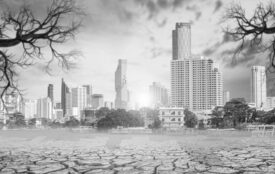For a solar age – with ethics and technology
Up to two billion people will have to live in hostile regions by the end of this century if the global community fails to meet the 1.5 Grand target. Droughts, floods, desertification, heat records, forest fires, health damage, millions of heat deaths, species extinction and refugee flows are coming our way.
Reconciling economy and ecology
Climate change is not coming, it is already here. It is time to face reality. It may be complicated, but it is not hopeless. At least since the Enlightenment some three hundred years ago, since the “de-ideologization” of the world, since philosophy ceased to be the “handmaiden of theology” (ancilla theologiae), our Western cultural model has been based on scientific knowledge – or so we believe. But why then do scientists around the world warn for years about climate change without actually being heard in politics and society or even causing appropriate action? Why is enlightenment in the traditional sense not enough to save us? We need a new enlightenment, a second, deeper enlightenment, to at least prevent the worst.
Our present environmental crisis is an “inner world crisis.” We think we are doing what we know. Yet we don’t really do what we know. The idea that rationality alone will save us is quite irrational. Man cannot come to his senses with reason alone. We are world champions in repression. Some, however, know exactly what they are doing. They usually sit at the top of corporations or at the cabinet table.
Many people are also afraid of the necessary changes. Sometimes, of course, politicians vote for the necessary changes out of fear. It was fear of skin cancer that led to the CFC ban. Fear of forest dieback brought our automobile industry the three-way catalytic converter. The lobbyists of the old energy industry are simply afraid for their sinecures. Politicians also know about their dependence on large corporations, and many citizens fly, drive cars and eat themselves sick with lots of meat, although they know what they are doing to themselves and the environment as well as to the future of their children. Is the truth really reasonable for us humans? Is the classical, purely rationalistic enlightenment sufficient for this?
Conservative and religious people trusted the wisdom of nature for thousands of years. But this trust is increasingly being shaken in times of climate warming and species extinction. Nature no longer plays along, it rather goes crazy, it has a fever and it goes on strike. We are in the process of losing our age-old trusted companion – nature as the source of our wealth and happiness. First of all, however, we should at least understand that we do not want to save the climate as such, but – quite egoistically – ourselves.
For this, we must succeed in a second enlightenment as quickly as possible. This means thinking together technology and ethics, religion and philosophy, nature and reason, freedom and responsibility. Only in this way will an “eco-spirituality” emerge. The Dalai Lama also speaks of “heart education”. If we do not understand this interdependence, our freedom will soon end in unfreedom. Climate heating is already producing this in many ways, for example for refugees or for farmers who are losing their land to the desert, or for elderly people who died – also in Europe – due to heat summers like those of 2003 and 2018. In 2003 alone, about 60,000 people died, according to EU statistics. In India, where the heat rose to an unbearable fifty degrees or more in the summer of 2019, thousands of elderly people died from overheating. And those were just the harbingers.
It is always amazing how hard it is for conservatives in particular to understand these connections. Yet one of the central tasks of conservatives is to preserve creation. Oh, if only conservatives were really conservative!
After the Enlightenment, many intellectuals believed that we could emancipate ourselves not only from our self-inflicted immaturity, but also from nature. In just three hundred years, we robbed nature of the raw materials it had accumulated over millions of years, blew the waste into the air, and filled the resulting giant holes with vast amounts of garbage. Today’s economists call that progress. And now? What follows the growth mania after the Enlightenment? Do we create an enlightenment of enlightenment that helps us to organize the change that is now necessary?
God or money?
For three hundred years, economists have believed that money is the basis of all economic activity. However, it is nature that deserves this name and forms the basis of the economy. Doing business on a dead earth makes little sense and does not bring jobs.
Economy and ecology both come from the Greek word oikos for “to keep house”. The rule of money is the main disease of our time. “The attempt to separate numbers from values leads to the total domination of numbers,” writes the founder of the “common good economy,” Christian Felber. He continues, “The separation of economy and ecology is one of the greatest sins of economic science.”
The multiplication of money does not make the world richer. We have created the most brutal poverty by wiping out about half of all species of life in the animal and plant kingdoms in the last fifty years. More money, but less wealth of life: Compared to this insane economy, theology is almost an exact science.
There can be a future only if we learn in the present to avoid the greatest mistakes of the past. Only then will we arrive in the real reality. Or in the divine order.
In the language of religion, God is identical with spirit and peace is another word for justice.
Energy crisis, refugee crisis and climate crisis are closely related. When we see these connections, we find solutions, and opportunities arise from crises. The key to solving all these crises is the energy crisis.
Spiritual sex: maturing instead of growing
We can mature spiritually, mentally, culturally or even religiously more and more, but never grow materially infinitely. Our material resources are limited, but the ideas of our mind are not. There is mind-sex. Pentecostal idea. Ideas can multiply, this is how progress and prosperity come about. And yet all the governments of the world propagate external economic growth. The only material being that grows infinitely is the cancer. With the philosophy of eternal growth, we are officially propagating a cancer economy. And this worldwide. But this can be deadly.
But how can we grow spiritually in the times of climate heating and environmental destruction in such a way that we – perhaps – still survive these challenges? How can we mature instead of grow? This is probably the question of all contemporary questions.
Many children and young people are beginning to see through us and to resist the burning mania, our pyromania.
It is not pathetic, but simply true: the end of human civilization has become possible.
But transformation is also possible – there are always alternatives. What we do, we can also leave. All problems caused by humans can also be solved by humans:
- Peace is possible
- Love is possible
- Justice is possible
- Compassion is possible
- climate protection is possible
- sustainable economy is possible and therefore
- a better world is possible
Of course, fine words must be followed by corresponding deeds. Only deeds are the proof of the truth of our words. Then utopias become concrete and realizable visions.
The only antidote to money and greed is compassion, teaches us Buddhism, but also the original Christianity.
The technical prerequisites for overcoming the fossil-atomic age are all given. We don’t have any problems of knowledge at all, we have masses of problems of implementation. Germany, with its technological lead in renewable energies, has no reason to fear the upcoming changes brought about by a one hundred percent energy turnaround. On the contrary, today’s resource crisis offers us a huge opportunity. With alternative energy technologies.
It is now entirely up to us to help the entry into the solar age achieve a breakthrough.
Can we still be saved?
Yes, we can still be saved! Still! Our future is not a blind destiny. The future is what we make of it today.
The basic program of Christianity is the Sermon on the Mount. And Buddha’s basic program is called compassion for all life. He teaches it in the “Eightfold Path”. The unrestrained neo-liberalism that prevails almost worldwide today has practically developed into a dictatorship of international finance capital. The Dalai Lama says in this regard: Money is an important medium of exchange, but “it is wrong to regard money as a god or a substance with a power of its own.” And Jesus asks his friends, “Whom will you serve: God or mammon? You must decide!”
Buddha and Jesus are the greatest, most enduring and compelling role models of the last 2,000 years. So far, we have learned too little from them. Otherwise we would neither make atomic bomb politics nor destroy our bases of life by leading a third world war against nature and thus against ourselves.
Source
Franz Alt 2023 | Translated with www.DeepL.com/Translator (free version)








